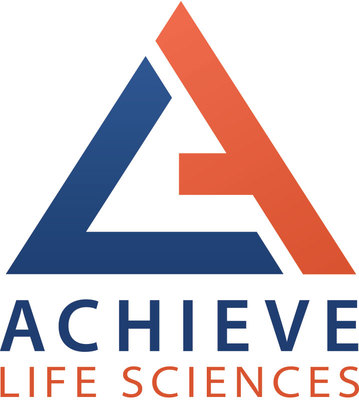Achieve Life Sciences, University of Bristol, and Oracle Corporation Announce Study Results Demonstrating Potential for Accelerated Speed of Drug Discovery
SEATTLE and VANCOUVER, British Columbia, Jan. 13, 2020 /PRNewswire/ -- Achieve Life Sciences, Inc. (Nasdaq: ACHV), University of Bristol, and Oracle Corporation (NYSE: ORCL) today announced the outcome of a study using Oracle's high-performance cloud infrastructure to potentially improve the speed of drug discovery and development of new treatments.

The study, "A General Mechanism for Signal Propagation in the Nicotinic Acetylcholine Receptor Family," was led by scientists from the University of Bristol and recently published in the Journal of the American Chemical Society. It aimed to evaluate how receptors in the brain respond to nicotine. Researchers utilized new computational simulation methods to conduct 450 individual assessments of the biochemistry associated with the binding of nicotine to a subtype of nicotinic acetylcholine receptors, a key mechanism believed to be responsible for the highly-addictive nature of nicotine.
Computations that would otherwise have taken months to complete were achieved in five days using Oracle's high-performance cloud infrastructure. The speed of results represents a breakthrough in computational chemistry and is transformational from a research perspective.
"To understand why nicotine is so addictive, and to develop molecules to help people quit smoking, we need to understand how nicotine affects the nervous system," commented Professor Adrian Mulholland from Bristol's Centre for Computational Chemistry and co-author of the study. "By harnessing the power of cloud computing, we can quickly observe how nicotine exerts its effects at the molecular level. This information can inform future drug development of new treatments for companies like Achieve."
Achieve Life Sciences has partnered with the University of Bristol to formulate molecules and potential treatments to combat addiction and neurological disorders based on their lead smoking cessation compound in development, cytisinicline. Building on this research and previously conducted studies, cloud-based computer simulations can now be utilized to evaluate the effectiveness of potential new treatments more efficiently and help to accelerate the pace of discovery.
About Achieve & Cytisinicline
Tobacco use is currently the leading cause of preventable death and is responsible for more than eight million deaths annually worldwide.1 It is estimated that 28.7% of cancer deaths in the U.S. are attributable to cigarette smoking.2 Achieve's focus is to address the global smoking health epidemic through the development and commercialization of cytisinicline.
Cytisinicline is a plant-based alkaloid with a high binding affinity to the nicotinic acetylcholine receptor. It is believed to aid in smoking cessation by interacting with nicotine receptors in the brain by reducing the severity of nicotine withdrawal symptoms and by reducing the reward and satisfaction associated with smoking.
As an approved, branded product in Central and Eastern Europe for more than two decades, it is estimated that over 20 million people have used cytisinicline to help combat nicotine addiction.
Forward Looking Statements
This press release contains forward-looking statements within the meaning of the "safe harbor" provisions of the Private Securities Litigation Reform Act of 1995, including, but not limited to, statements regarding the timing and nature of cytisinicline clinical development activities, the potential market size for cytisinicline, the potential benefits of cytisinicline, the ability to discover and develop new uses for cytisinicline and the development and effectiveness of new treatments. All statements other than statements of historical fact are statements that could be deemed forward-looking statements. Achieve may not actually achieve its plans or product development goals in a timely manner, if at all, or otherwise carry out its intentions or meet its expectations or projections disclosed in these forward-looking statements. These statements are based on management's current expectations and beliefs and are subject to a number of risks, uncertainties and assumptions that could cause actual results to differ materially from those described in the forward-looking statements, including, among others, the risk that cytisinicline may not demonstrate the hypothesized or expected benefits; the risk that Achieve may not be able to obtain additional financing to fund the development of cytisinicline; the risk that cytisinicline will not receive regulatory approval or be successfully commercialized; the risk that new developments in the smoking cessation landscape require changes in business strategy or clinical development plans; the risk that Achieve's intellectual property may not be adequately protected; general business and economic conditions; and the other factors described in the risk factors set forth in Achieve's filings with the Securities and Exchange Commission from time to time, including Achieve's Annual Reports on Form 10-K and Quarterly Reports on Form 10-Q. Achieve undertakes no obligation to update the forward-looking statements contained herein or to reflect events or circumstances occurring after the date hereof, other than as may be required by applicable law.
Achieve Contact
Jason Wong
jwong@bplifescience.com
(415) 375-3340 ext. 4
1World Health Organization. WHO Report on the Global Tobacco Epidemic, 2019. Geneva: World Health Organization, 2017
2 Annals of Epidemiology, Volume 25, Issue 3, 179 - 182.e1
![]() View original content to download multimedia:http://www.prnewswire.com/news-releases/achieve-life-sciences-university-of-bristol-and-oracle-corporation-announce-study-results-demonstrating-potential-for-accelerated-speed-of-drug-discovery-300985427.html
View original content to download multimedia:http://www.prnewswire.com/news-releases/achieve-life-sciences-university-of-bristol-and-oracle-corporation-announce-study-results-demonstrating-potential-for-accelerated-speed-of-drug-discovery-300985427.html
SOURCE Achieve Life Sciences, Inc.
Released January 13, 2020